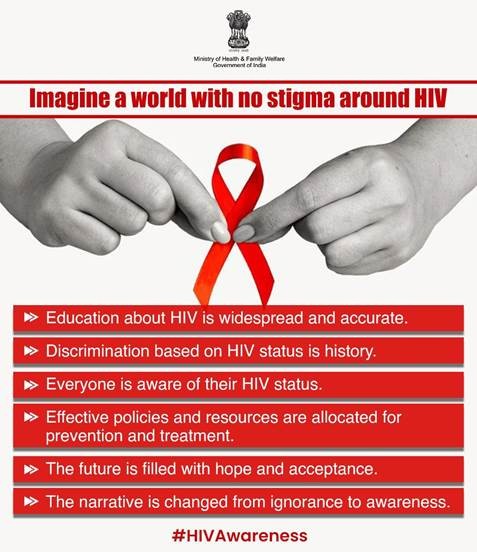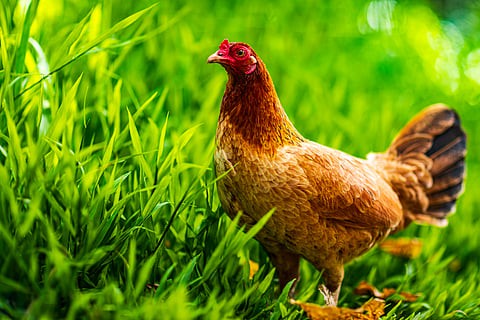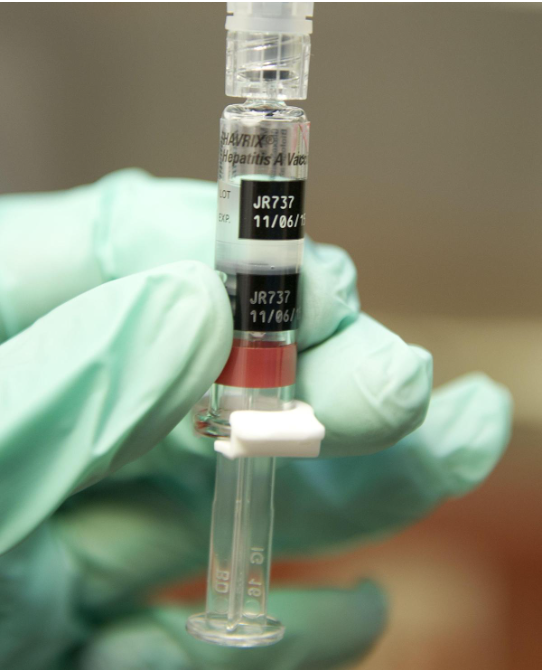Description

Copyright infringement not intended
Picture Courtesy: pcoschallenge.org
Context: Polycystic Ovary Syndrome (PCOS) is a complex hormonal disorder that can have various health implications, including infertility, obesity, heart disease, and mental health challenges.
Details
- Polycystic ovary syndrome (PCOS) is a common hormonal disorder affecting up to 10% of women of childbearing age. The disorder stems from an imbalance in hormones governing the menstrual cycle, ovulation, and other bodily functions.
- PCOS occurs due to a combination of genetic and environmental factors. It involves an imbalance in hormones, particularly elevated levels of androgens (male hormones) and insulin resistance. The exact cause is still under study, but genetics and lifestyle play significant roles.

Common symptoms of PCOS
- Irregular Menstrual Periods: Women with PCOS often have irregular or infrequent menstrual cycles. Some may experience missed periods for several months or have cycles that are too long or too short.
- Excess Hair Growth (Hirsutism): Elevated levels of androgens (male hormones) in PCOS can lead to excessive hair growth on the face, chest, back, and other body areas. This condition is called hirsutism.
- Weight Gain: Many women with PCOS struggle with weight gain, particularly around the abdomen. Insulin resistance, common in PCOS, can contribute to weight gain.
- Acne and Oily Skin: PCOS can result in acne and excessively oily skin due to the influence of high androgen levels.
- Male-Pattern Baldness or Thinning Hair: Some individuals with PCOS experience male-pattern baldness or hair thinning, typically associated with androgen excess.
- Infertility: Irregular ovulation or lack of ovulation (anovulation) can make it challenging for women with PCOS to conceive. PCOS is one of the leading causes of female infertility.
- Skin Tags: Women with PCOS may develop small, benign growths of excess skin, often found in the neck, underarms, or other body folds. These are called skin tags.
- Darkened Skin Patches (Acanthosis Nigricans): PCOS can lead to the development of dark, thickened patches of skin, typically in body areas with friction, such as the neck, armpits, and under the breasts. This condition is known as acanthosis nigricans.
- Pelvic Pain: Some women with PCOS may experience pelvic pain or discomfort, often related to the presence of ovarian cysts.
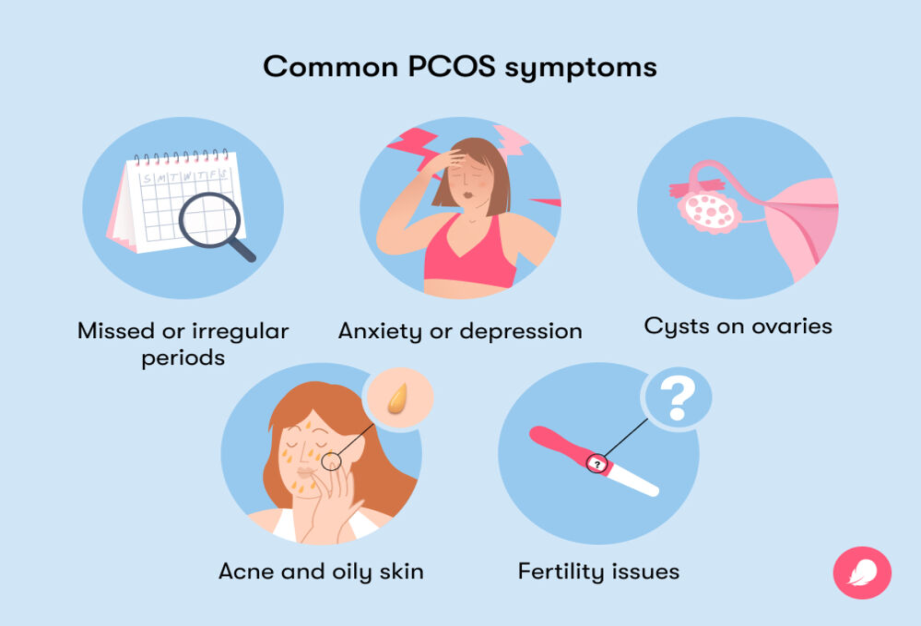
Picture Courtesy: flo.health
PCOS can have several long-term health impacts
- Fertility Issues: PCOS is a leading cause of infertility in women. Irregular ovulation or anovulation (lack of ovulation) can make it challenging to conceive naturally. Women with PCOS may require fertility treatments to achieve pregnancy.
- Metabolic Effects: PCOS is often associated with insulin resistance, a condition where the body's cells do not respond effectively to insulin. This can lead to elevated blood sugar levels and an increased risk of developing type 2 diabetes. Insulin resistance is also linked to weight gain, particularly around the abdomen.
- Weight Management Challenges: Many women with PCOS struggle with weight management. Weight gain is not only a symptom but also a risk factor for the condition. The hormonal imbalances in PCOS can make it more difficult to lose weight, leading to a cycle of weight gain and insulin resistance.
- Cardiovascular Risk: PCOS is associated with an increased risk of heart disease and high blood pressure. The combination of insulin resistance, obesity, and elevated androgen levels can contribute to cardiovascular issues.
- Psychological Impact: Living with PCOS can be emotionally challenging. The visible symptoms, such as hirsutism and acne, can affect self-esteem and body image. The struggle with fertility can lead to stress, anxiety, and depression for many women with PCOS.
- Endometrial Cancer Risk: Irregular or infrequent menstrual cycles in PCOS can result in overgrowth of the uterine lining (endometrium). Over time, this can increase the risk of endometrial cancer.
- Menstrual Discomfort: Irregular and heavy periods associated with PCOS can cause discomfort and inconvenience for affected individuals.
- Hair and Skin Issues: Excessive hair growth (hirsutism) and acne can impact self-confidence and quality of life.
- Long-Term Health Implications: Women with PCOS may be at a higher risk of developing other health conditions later in life, including gestational diabetes during pregnancy and sleep apnea.
The impact of PCOS can vary from person to person, with some individuals experiencing more severe symptoms and complications than others. Early diagnosis and appropriate management are crucial in mitigating these effects and improving the overall quality of life for individuals with PCOS.
Management and Cure of PCOS
- While there is no cure for PCOS, it can be managed effectively through lifestyle changes, medications, and sometimes surgical interventions. The management of PCOS primarily focuses on alleviating symptoms, preventing complications, and improving overall health.
Lifestyle Modifications
- Healthy Diet: Adopt a balanced diet that includes plenty of fruits, vegetables, lean proteins, and whole grains. Limit the intake of refined carbohydrates and sugar, as insulin resistance is often associated with PCOS.
- Regular Exercise: Engaging in regular physical activity can help improve insulin sensitivity, manage weight, and reduce the severity of PCOS symptoms.
- Weight Management: Losing even a modest amount of weight (5-10% of body weight) can significantly improve PCOS symptoms, including menstrual irregularities and fertility.
- Stress Reduction: Stress can exacerbate PCOS symptoms, so practising stress-reduction techniques like yoga, meditation, or deep breathing exercises can be beneficial.
.jpg)
Medications
- Birth Control Pills: Oral contraceptives can regulate menstrual cycles and reduce androgen levels (male hormones) in women with PCOS. They can also help control acne and excess hair growth.
- Anti-Androgen Medications: Medications like spironolactone can be prescribed to reduce symptoms such as hirsutism (excess hair growth) and acne.
- Metformin: This medication is often prescribed to improve insulin sensitivity, which can help manage weight and regulate menstrual cycles in some women with PCOS.
- Ovulation Induction Surgery: In some cases, a surgical procedure called laparoscopic ovarian drilling may be recommended to induce ovulation in women who don't respond to medications.
Dietary Supplements and Regular Monitoring
- Some women with PCOS may benefit from supplements like inositol and vitamin D. However, it's important to consult with a healthcare provider before taking any supplements.
- Regular check-ups with healthcare providers are essential to monitor progress and adjust treatment plans as needed.
- Living with PCOS can be challenging, and it's important to seek emotional support from friends, family, or support groups. Mental health is an integral part of overall well-being.
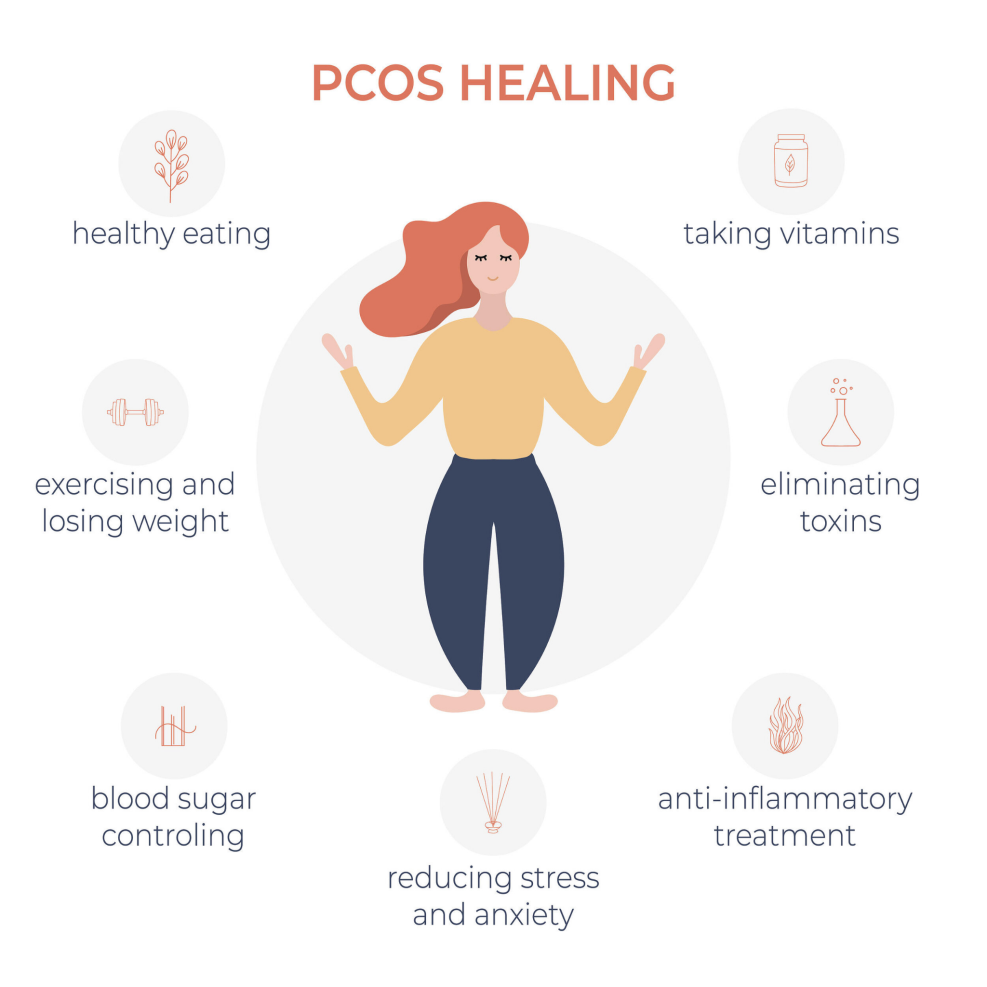
Picture Courtesy: mapleleafmedical.com.au
Conclusion
- PCOS is a complex hormonal disorder with a range of symptoms and potential long-term health consequences. While it cannot be cured, it can be effectively managed through lifestyle changes and medical interventions to improve quality of life and reduce the risk of associated health conditions
|
PRACTICE QUESTION
Q. Consider the following statements:
Statement 1: Irregular menstrual periods are a common symptom of PCOS.
Statement-2: All women with PCOS experience hirsutism.
Which one of the following is correct in respect of the above statements?
A) Both Statement-1 and Statement-2 are correct, and Statement-2 is the correct explanation for Statement-1.
B) Both Statement-1 and Statement-2 are correct, and Statement-2 is not the correct explanation for Statement-1.
C) Statement-1 is correct, but Statement-2 is incorrect.
D) Statement-1 is incorrect, but Statement-2 is correct.
Answer: C
Explanation:
Statement-1 is correct as irregular menstrual periods are a common symptom of PCOS. However, Statement-2 is incorrect as not all women with PCOS experience hirsutism; it's a symptom that varies from person to person.
|









